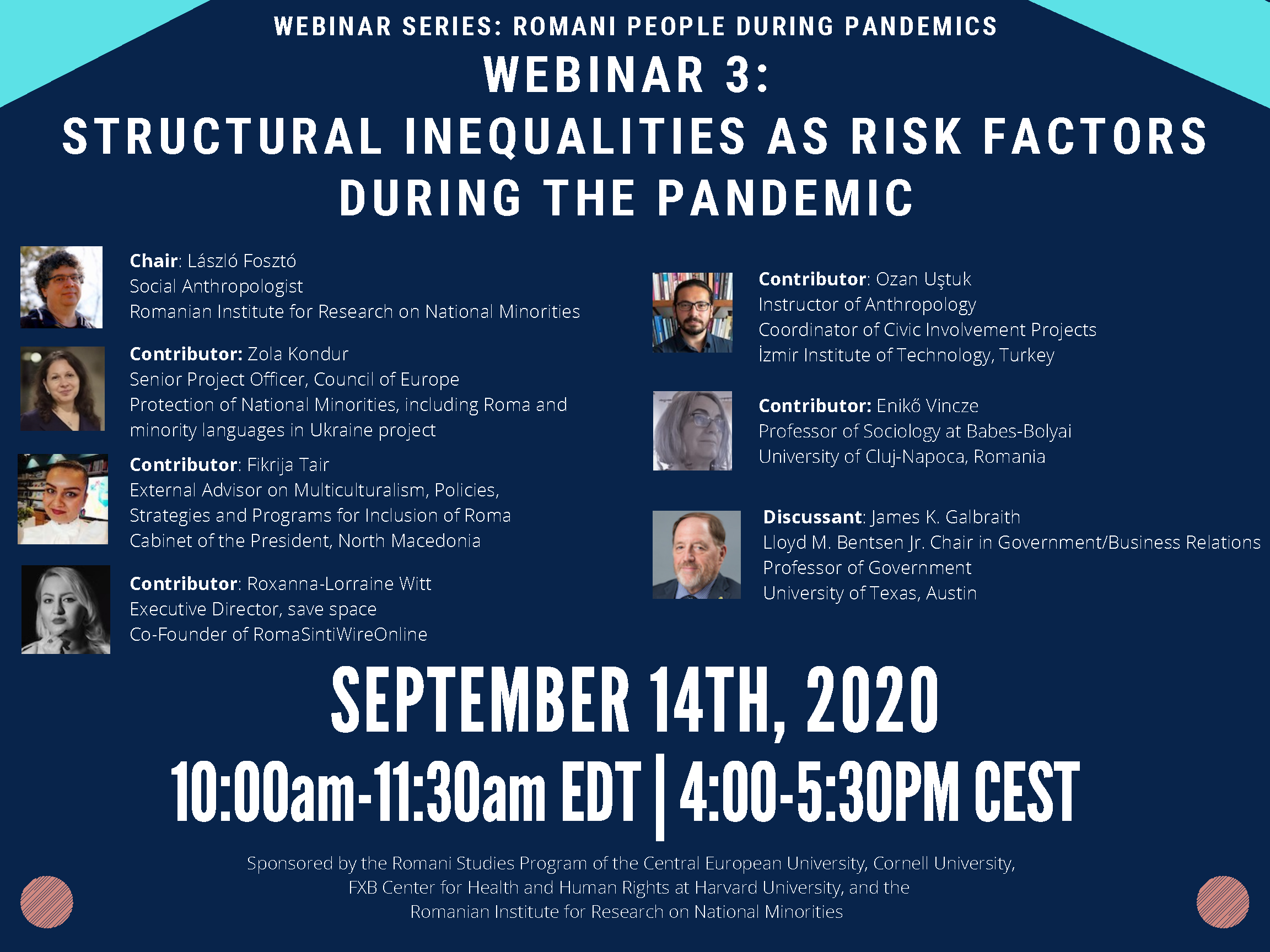
On September 14, 2020, leading scholars and activists will discuss the additional challenges and risks Romani people are facing during the COVID-19 pandemic during a webinar, “Structural Inequalities as Risk Factors During Pandemic.” The event will be held from 10 to 11:30 a.m. EDT (4 to 5:30 p.m. CEST). The event will be streamed live on the Facebook page of the Central European University Romani Studies Program.
Speakers

Chair | László Fosztó, Social Anthropologist, the Romanian Institute for Research on National Minorities
László Fosztó is a social anthropologist working at the Romanian Institute for Research on National Minorities. His area of research is the study of Romani groups with focus on communicative practices, religion and ritual, economy and migration, identity, social activism and transnational networks. Main publications: Ritual Revitalisation after Socialism: Community, Personhood, and Conversion among the Roma in a Transylvanian Village, Halle Studies in the Anthropology of Eurasia, 21. Münster: LIT, 2009, and Colecţie de studii despre romii din România, [Collected Studies about the Romanian Roma] ISPMN–Kriterion, Cluj-Napoca 2009. He serves as secretary of the European Academic Network on Romani Studies (since 2011) a joint initiative of the European Commission and Council of Europe.

Contributor | Zola Kondur, Senior Project Officer, Council of Europe, Protection of National Minorities, Including Roma and Minority Languages in Ukraine Project
Zola Kondur has been a lifelong human rights advocate. She was raised in a traditional Roma family, but unlike many traditional families, the parents gave education to all six children. In 1997, Kondur became the head of the Roma Association’s Sunday school. During that time, Kondur encountered Roma children whose rights were violated, including those who lacked access to quality education and health care.
In response to a serious lack of services for Roma girls, Zola helped to launch the Chiricli International Roma Women Fund in 2000 to advocate on behalf of Roma women across Ukraine and Eastern Europe.
Kondur’s advocacy on human rights and passion for Roma issues has led to consultancies with international human rights organizations, including her current role with the Council of Europe. From 2019, Zola has served as a Tolerance Ambassador for UNDP Ukraine.

Contributor | Fikrija Tair Will Not Be Able To Join Us for the Webinar
Fikria Tair is an External Advisor on Multiculturalism, Policies, Strategies and Programs for Inclusion of Roma, Cabinet of the President, North Macedonia. She holds an MA in Public Policy from the School of Public Policy at the Central European University (CEU) – area of concertation Governance and BS in Economics from the Ss. Cyril and Methodius University in Skopje. She was also part of the Roma Graduate Preparation Program at CEU. Fikrija is REF, CEU and Romaversitas alumni.
She has years of experience in the civil sector on topics related to education of Roma students, social inclusion, leadership, advocacy and lobbying, multiculturalism, youth, innovative and entrepreneurial learning, campaign management, organizing and empowering the Roma community, political empowerment of Roma women, and other activities and events related to Roma and people with fewer opportunities.
Currently, she is External Advisor on Multiculturalism, Policies, Strategies and Programs for Inclusion of Roma in the Republic of North Macedonia at the Cabinet of the President of the Republic of North Macedonia.
She worked at the Romaversitas Citizens’ Association in Skopje as Project Coordinator for Academic and Professional Development of Roma in Higher Education, Professional Orientation and Career Planning of Roma High School Graduates, Labor Market Integration and Youth Activism. She was associated as an intern at the Center for Policy Studies (CPS) at the Central European University in Budapest, worked as a junior researcher at the European Policy Institute in Skopje, as part of the Open Society Foundation’s program, “Making the most of EU funds for Roma”, and did an internship at the National Bank in North Macedonia in the Internal Audit Department. Fikrija also was part of the Civic Initiative “Avaja”, part of projects implemented by CSO working on policies related to Roma, as well as projects implemented by the National Democratic Institute (NDI) in Skopje, the Business Confederation of Macedonia, the Central Council of German Sinti and Roma etc.

Contributor | Roxanna-Lorraine Witt, Executive Director, save space and Co-Founder, RomaSintiWireOnline
Roxanna-Lorraine Witt was born in Germany in 1993 to a Family of Gadjkene Sinti. She has studied Marine Biotechnology at the University of Applied Science Bremerhaven and, until the beginning of this year, was head of the Educational Office at the Central Council of German Sinti and Roma. She has specialized in research on radicalization processes in digital spaces and co-founded save space – an NGO with main-focus on intersectionality, inclusion, digitalization and youth culture, as well as the digital platform RomaSintiWireOnline, which strives to provide more visibility for Romani identities, knowledge, and culture.

Contributor | Ozan Uştuk, Instructor of Anthropology and the coordinator of Civic Involvement Projects, İzmir Institute of Technology
Ozan Uştuk is an Instructor of Anthropology and the coordinator of Civic Involvement Projects at İzmir Institute of Technology. He holds a Ph.D. in Communication Sciences from Hacettepe University in Turkey, for which he conducted ethnographic fieldwork among a Roma community living in a hyper-ghetto neighborhood, by particularly focusing on housing, education, and labor market relations. He received his M.Sc. in the field of Anthropology, and B.A. in Sociology. He currently holds the Applied Research Fellowships at CEU Romani Studies Program. His research interests include intercultural communication, social inclusion, and identity politics. He has been collaborating with several local and national Roma organizations, NGOs, and governmental agencies since 2014.

Contributor | Enikő Vincze, professor of sociology at Babes-Bolyai University of Cluj-Napoca, Romania
Enikő Vincze is a professor of sociology at Babes-Bolyai University of Cluj-Napoca, Romania. Currently, she offers courses on European social agenda, sociology of international relations, critical urban theory and methodology of social research. During the 1990s, she conducted research on nationalism, ethnic identity politics and feminism. Since 2004, she participated on and/or coordinated investigations and published studies on processes and causes of exclusion and marginalization of ethnic Roma in healthcare, school education, labor market and housing, including the examination of intersectional discrimination of Romani women and the political potential of Romnia, and as well as of how capitalism and neoliberal governance are connected to spatial, housing and development politics. Since 2010, she has been involved in housing rights and social justice activism, being part of the local Căși sociale ACUM!/Social housing NOW! movement, and the national network Bloc for Housing. The recent volumes on which she had a contribution as co-editor and co-author are: Racialized Labour in Romania. Spaces of Marginality at the Periphery of Global Capitalism (Palgrave); and A Reflexive History of the Romani Women’s Movement: Struggles and Debates in Central and Eastern Europe (Routledge).

Discussant | James K. Galbraith, Lloyd M. Bentsen Jr. Chair in Government/Business Relations and Professor of Government, University of Texas, Austin
James K. Galbraith holds the Lloyd M. Bentsen Jr. Chair in Government/Business Relations at the Lyndon B. Johnson School of Public Affairs and a professorship in Government at The University of Texas at Austin.
Galbraith holds degrees from Harvard University (BA) and Yale University (MA, M.Phil, PhD). He was Executive Director of the Joint Economic Committee of the United States Congress in the early 1980s and has advised the State Planning Commission of P.R. China and the Greek Finance Ministry. He chaired the board of Economists for Peace and Security from 1996 to 2016 (www.epsusa.org) and directs the University of Texas Inequality Project (http://utip.lbj.utexas.edu). He is a managing editor of Structural Change and Economic Dynamics.
In 2010, he was elected to the Accademia Nazionale dei Lincei. In 2014 he was co-winner with Angus Deaton of the Leontief Prize for Advancing the Frontiers of Economics. In 2020 he received the Veblen-Commons Award of the Association for Evolutionary Economics.
Galbraith’s recent books include:
Welcome to the Poisoned Chalice: The Destruction of Greece and the Future of Europe (2016);
Inequality: What Everyone Needs to Know (2016);
The End of Normal: The Great Crisis and the Future of Growth (2014);
Inequality and Instability: A Study of the World Economy Just Before the Great Crisis (2012).
The Predator State: How Conservatives Abandoned the Free Market and Why Liberals Should Too (2008).
This event is the third in the four-part webinar series, “Romani People During Pandemics.” The webinar series aims to:
- Discuss past and present patterns of fearing or blaming Roma during pandemics and place these patterns in the broader history of scapegoating in times of crisis.
- Draw attention to various responses chosen by state representatives and their rationale. We will discuss discriminatory measures by local or state institutions who imposed Roma-only, disproportionate, or militarized measures in Romani neighborhoods or towns.
- Focus on effective responses implemented at local, national, or international levels by state and non-state actors to protect Romani people, their health and well-being in times of pandemic and outside of them.
Upcoming Webinar
Please save the date for the final webinar in this series (more details coming soon):
Responses to COVID-19 at Local, National, and International Levels
October 8, 2020 from 3 to 4:30 pm CEST / 9 to 10:30 a.m. EDT
This webinar series is organized by the FXB Center for Health and Human Rights at Harvard University, the Romani Studies Program of the Central European University, the Romanian Institute for Research on National Minorities (ISPMN), and Cornell University.









